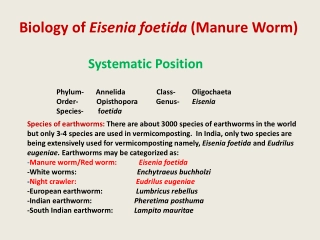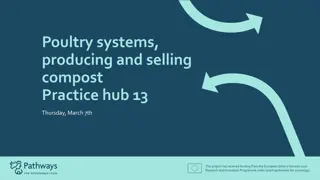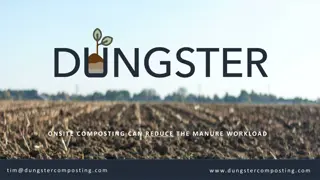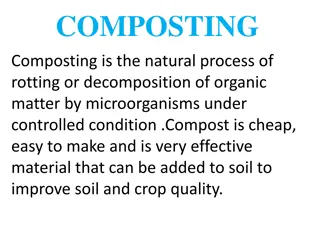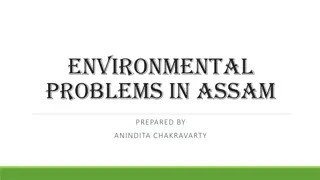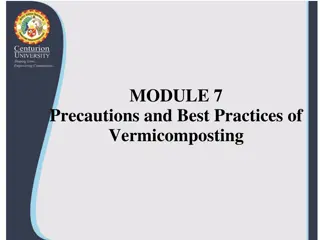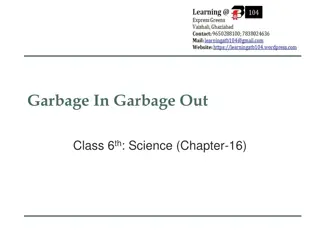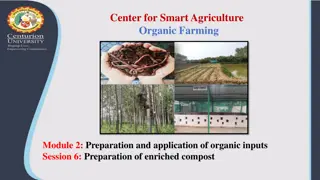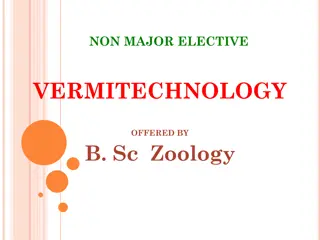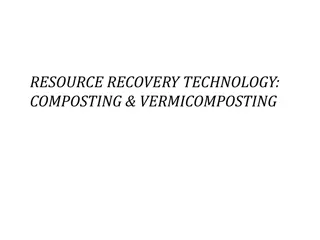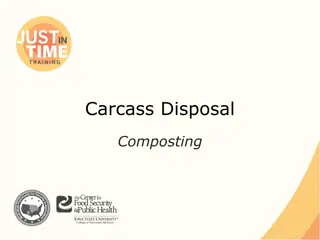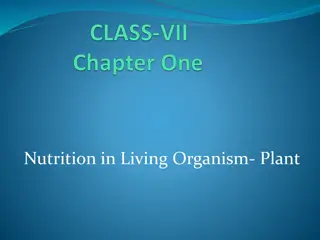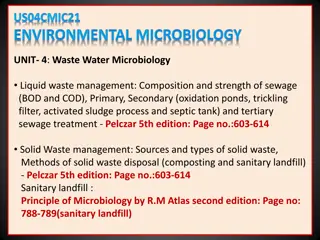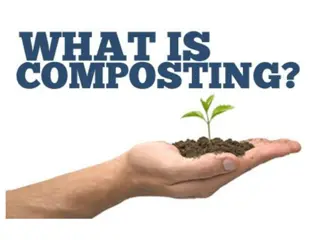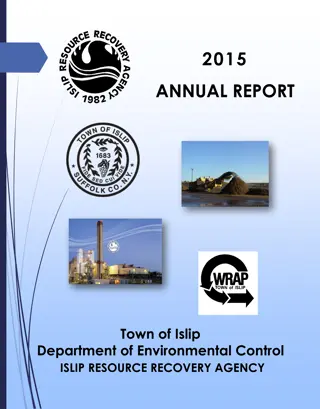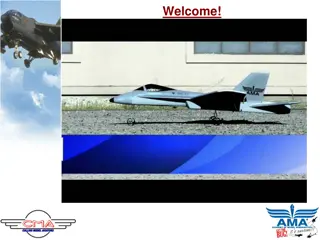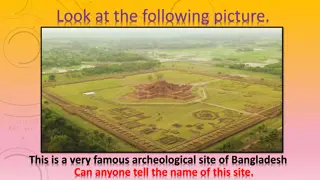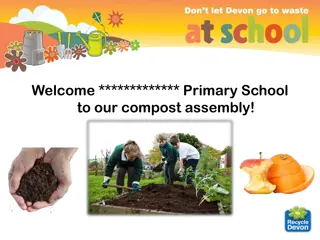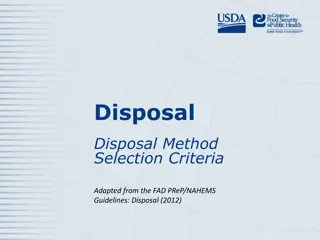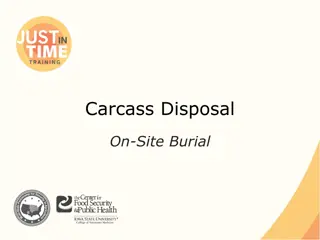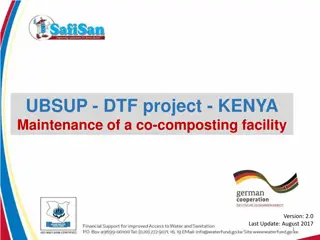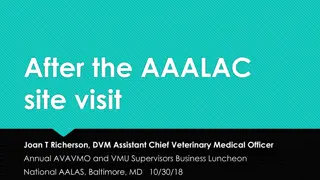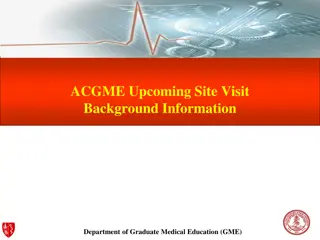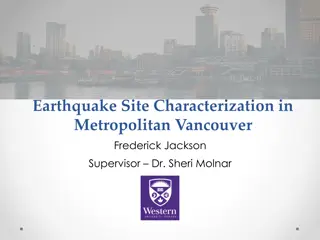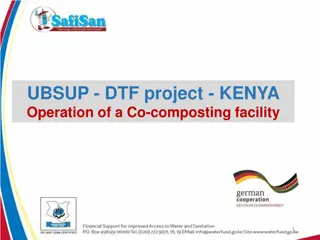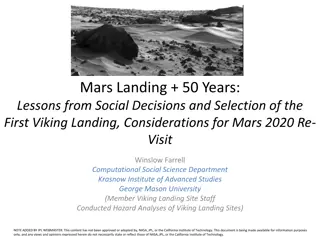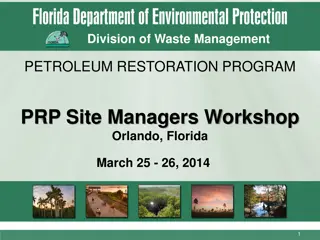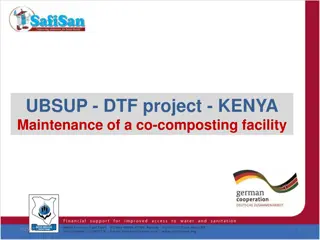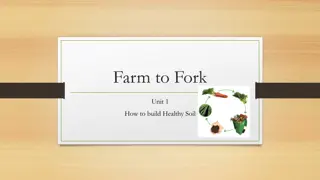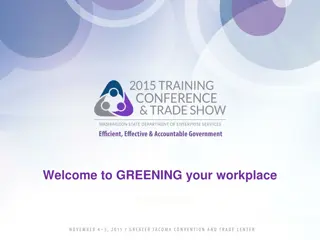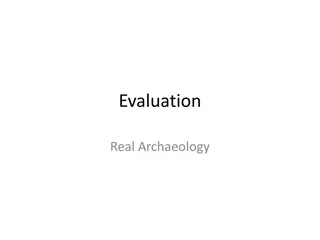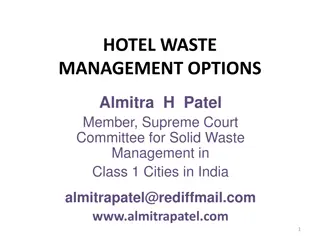Biology of Eisenia foetida (Manure Worm)
Learn about Eisenia foetida, a key earthworm species used in vermicomposting, its identification, ecology, efficiency, and morphology. Discover its burrowing habits, feeding behavior, reproduction capabilities, and environmental preferences for optimal performance in composting.
0 views • 25 slides
Embracing the Zero Waste Program at California State University, Los Angeles
California State University, Los Angeles is committed to achieving zero waste by repurposing bins, piloting Bigbelly stations, and expanding composting efforts. The Zero Waste Program aims to minimize landfill waste by recycling and composting valuable resources, guided by ethical and sustainable pr
3 views • 13 slides
Farmer Cooperative's Innovative Poultry Composting Project
Farmer cooperative Fertil Eveil is leading an innovative project focused on producing and sharing compost from plant-based litter within a Practice Hub environment. With multiple composting platforms established in France, the cooperative aims to improve nutrient management and assess the impact of
3 views • 6 slides
Efficient On-Site Composting Methods for Reducing Manure Workload
On-site composting can significantly reduce the workload associated with managing manure on small farms. By following principles of economy of effort and the O.H.I.O principle (Only Handle It Once), manual loading methods and efficient composting techniques can transform manure into valuable compost
6 views • 19 slides
Why Is It Advised To Choose On Site Mix Concrete For Your Site Work
Unsure about concrete for your construction site? Explore the benefits of on-site mixed concrete - cost-effective, fresh, and customizable. Learn why it might be the perfect solution!
2 views • 5 slides
Effective Methods of Composting for Sustainable Soil Enrichment
Composting is a natural process of organic matter decomposition, beneficial for improving soil quality. The Bangalore Method, Construction of Pit, Filling the Pit, Modified Bangalore Method, and Padegaon Method are efficient techniques used to produce high-quality compost for agricultural purposes.
0 views • 13 slides
Environmental Challenges in Assam: Solid Waste and Deforestation Issues
Assam faces critical environmental problems such as solid waste mismanagement and deforestation. The syllabus emphasizes three main issues: solid waste management, deforestation, and watershed management. Solid waste, categorized by origin, hazard potential, and contents, poses significant challenge
0 views • 15 slides
Precautions and Best Practices of Vermicomposting
Learn the essential precautions and best practices for successful vermicomposting. Discover the ideal earthworm species, suitable materials, protection methods, watering tips, and post-composting care. Follow temperature, moisture, pH guidelines, avoid certain materials, and maintain proper drainage
0 views • 7 slides
Managing Garbage: A Comprehensive Overview for Class 6 Science
This educational material delves into the science of garbage management, covering topics such as types of garbage, how to deal with garbage, components of garbage, recycling, composting, vermicomposting, and the impact of plastics on the environment and health. It emphasizes the importance of proper
0 views • 14 slides
Enhancing Compost Quality for Organic Farming: Phosphorous-Enriched Compost Preparation
Composting is a natural process crucial for organic farming. Enriched compost improves nutrient supply to crops. Learn how to prepare phosphorous-enriched compost using organic wastes, bio-inoculants, and rock phosphate. Follow a method involving layering organic materials, cow dung, and rock phosph
3 views • 8 slides
Vermitechnology and Composting: Sustainable Waste Management Solutions
Solid waste management is crucial in the face of increasing urbanization. Composting and vermitechnology offer natural and effective ways to treat organic waste, with earthworms playing a key role in bioconversion processes. Utilizing organic wastes like animal manure, crop residues, and food waste,
1 views • 12 slides
Guide to Operating a Co-composting Facility in Kenya
Explore the operations of a co-composting facility in Kenya through detailed images and descriptions. Learn about the areas within the co-composting shed, materials required, composition of windrows, and the process of turning windrows in the co-composting project. Discover the ideal combinations of
1 views • 20 slides
Understanding Composting and Vermicomposting Technology
Composting and vermicomposting are controlled decomposition processes of organic materials, with aerobic microbes breaking down the matter in the presence of oxygen. Aerobic composting produces stable humus and helps eliminate pathogens and weed seeds. The processes involve microbial respiration, ga
1 views • 29 slides
Effective Carcass Disposal Through Composting
Composting carcasses with organic materials can accelerate biological decomposition, destroy pathogens, and produce a nutrient-rich humus. Proper carbon-to-nitrogen ratios, moisture levels, oxygen maintenance, and temperature control are crucial for the efficiency of the composting process. Mixing a
0 views • 21 slides
Explore LifeSmarts: Environment - Promoting Sustainability and Awareness
Discover ways to protect our environment, from conserving water and improving air quality to preserving habitats and embracing the mantra "Less is More, Use It Again." Learn about recycling, reducing waste, composting, and the importance of surface water and groundwater. Uncover the significance of
0 views • 29 slides
Understanding Nutrition in Plants and Their Relationship with the Environment
This educational content delves into the various modes of nutrition in plants, including heterotrophic and autotrophic nutrition, as well as saprotrophic and parasitic nutrition. It explains the process of photosynthesis, absorption of water through roots, oxygen production, and symbiotic relationsh
0 views • 13 slides
Effective Strategies for Sustainable Weed Management
Discover sustainable weed management strategies involving identification, proper tools for control, composting techniques, organic production methods, and practical tips such as preventing weeds from seeding, cost-effective cultivation practices, and the benefits of cover cropping. Understanding the
1 views • 20 slides
Understanding Waste Water Microbiology and Solid Waste Management
Waste water microbiology involves the analysis of liquid waste in terms of its composition, strength (BOD and COD), and treatment processes. It covers the sources and types of solid waste, along with methods of disposal like composting and sanitary landfilling. The chemical characteristics of waste
0 views • 36 slides
Understanding the Fundamentals of Composting
Compost is organic matter decomposed into a valuable fertilizer and soil amendment. The process involves aerobic decomposition of waste material, turning it into nutrient-rich humus. Composting requires a mix of organic matter, water, air, and proper carbon:nitrogen ratio for efficient breakdown. Th
0 views • 21 slides
Town of Islip Department of Environmental Control Annual Report 2015
The Islip Resource Recovery Agency and the Department of Environmental Control manage solid waste services for Islip town residents, including recycling, waste-to-energy, composting, and C&D debris facilities. They also emphasize recycling education and operate the Islip Animal Shelter. The Blydenbu
0 views • 13 slides
Proposal for Radio Controlled Model Aircraft Site Development
To establish a working relationship for the development of a site suitable for radio-controlled model aircraft use, the proposal suggests local land ownership with oversight from a responsible agency. Collins Model Aviators is proposed as the host club, offering site owner liability insurance throug
0 views • 20 slides
The Archaeological Site of Paharpur in Bangladesh
Paharpur, an important archaeological site in Bangladesh, is home to a lofty ancient temple situated on a hill. The site has been excavated multiple times by archaeologists, revealing significant historical remnants. The ruins of a square tower were discovered, and the site was declared protected un
0 views • 14 slides
Engaging Compost Assembly for Primary School Students
Explore the interactive compost assembly at a primary school, covering topics like the importance of composting, what can be composted, the process of composting, and ways for everyone to participate. The assembly features engaging visuals and a compost chant, encouraging students to take action in
0 views • 9 slides
Guidelines for Animal Disposal Methods
Environmental and biosecurity guidelines recommend various disposal methods such as composting, rendering, permitted landfill, unlined burial, fixed-facility incineration, and open-air burning. Each method has specific selection criteria and considerations to minimize risks to the environment and bi
0 views • 17 slides
On-Site Burial for Carcass Disposal: Methods and Environmental Impacts
Explore the process of carcass disposal through on-site burial, covering topics such as trench burial, site selection, construction and design considerations, environmental impacts, and a comparison with other disposal methods. Learn about key factors influencing on-site burial, including soil prope
0 views • 13 slides
Guidelines for Maintaining a Co-Composting Facility in Kenya
Learn about the moisture and temperature control requirements for managing a co-composting facility in Kenya. Discover troubleshooting tips for addressing issues such as odors, climatic influences, and vectors. Follow step-by-step instructions to monitor temperature levels and ensure efficient compo
0 views • 8 slides
AAALAC Site Visit Guidelines and Procedures
AAALAC site visits entail assessments conducted by a team to determine compliance with animal care standards. After the visit, institutions may receive SFIs that are recommendations for improvement or mandatory deficiencies requiring correction. The exit briefing allows for clarification and immedia
0 views • 25 slides
ACGME Site Visit Information for Graduate Medical Education Programs
Explore the upcoming site visit background information for Graduate Medical Education (GME) programs by ACGME, focusing on allergy & immunology programs. Learn about the roles of site visitors, requirements for program accreditation, and the use of survey data to enhance program quality and complian
0 views • 14 slides
Seismic Site Characterization in Metropolitan Vancouver
The Greater Vancouver area faces high seismic risk due to its population density and critical infrastructure. Ground shaking during large earthquakes depends on various factors including the earthquake source, material properties, and site conditions. Efforts are being made to map seismic hazards, u
0 views • 13 slides
Guide to Co-composting Facilities Operation in Kenya and Benin
Explore the user's guide for operating a co-composting facility in Kenya and Benin, covering areas such as material storage, composition of windrows, and the co-composting process. Learn about the ideal layers for windrows, turning schedules, and creating the perfect balance of nitrogen and carbon f
0 views • 22 slides
Social Processes in Viking 1 Landing Site Selection
The selection of the Viking 1 landing site was driven by social processes, involving the combined efforts of the Viking flight team, daily activities of the Landing Site staff, and decision-making based on recommendations and votes. The study applied analytical techniques like radar interpretations
0 views • 10 slides
Petroleum Restoration Program Site Managers Workshop in Orlando, Florida
The division of Waste Management organized the Petroleum Restoration Program (PRP) Site Managers Workshop in Orlando, Florida on March 25-26, 2014. The workshop covered various topics related to PRP, including procurement workflow, scope of work development, remediation strategies, site closure, and
0 views • 48 slides
Maintenance and Troubleshooting Guidelines for Co-composting Facility in Kenya
Learn about moisture control, temperature management, and troubleshooting tips for a co-composting facility in Kenya. Ensure proper moisture content between 40% to 60%, monitor temperature changes weekly, and troubleshoot odor and climatic influences effectively. Follow user guides and protocols for
0 views • 8 slides
Understanding Website Navigation and Site Maps
Website navigation and site maps are essential components for professional web applications with numerous pages. Response.Redirect() and Server.Transfer() methods are useful for page navigation, but for complex applications, creating a site map using ASP.NET's XMLSiteMapProvider is recommended. The
0 views • 13 slides
Building Healthy Soil Through Composting: A Practical Guide
Learn how to build healthy soil through composting in this comprehensive guide. From creating compost piles to understanding the decomposition process, discover the benefits of composting for reducing waste and improving soil quality.
0 views • 4 slides
Greening Your Workplace: Why and How to Implement Organic Composting and Recycling
There are compelling reasons to go green at your workplace, such as preserving natural resources, setting a positive example for employees, improving efficiency, and creating a healthier work environment. Discover the benefits of installing organic composting and recycling systems in your facility a
0 views • 21 slides
Understanding Phases of Archaeological Evaluation for Site Preservation
In historic preservation archaeology, the evaluation process involves distinct phases from background research to data recovery. During a Phase 2 evaluation, archaeologists assess a site's eligibility for listing on the National Register of Historic Places by determining its integrity and potential
0 views • 13 slides
Spotting the Right Development Site and Determining Potential Yield with Parker Scanlon Surveying & Town Planning
Discover key factors in identifying the right development site and assessing its potential yield, including site access, zoning regulations, site slope considerations, and flood risk management. Parker Scanlon offers expert guidance using advanced technologies and vast experience in serving various
0 views • 17 slides
Sustainable Hotel Waste Management Options
Explore various sustainable waste management options for hotels including on-site food waste management, biogas production, composting, animal feed utilization, feeding food leftovers to pigs, and sharing excess food with those in need. These eco-friendly practices help minimize waste and promote a
0 views • 9 slides
Review and Assumptions of Christchurch U3A Future Website and Beacon System
This presentation delves into the functionalities of the current site builder and Beacon system. Assumptions are made about the upcoming site builder v2, ensuring it maintains existing capabilities. Beacon will play a pivotal role in site management with changes reflecting instantly on the website.
0 views • 8 slides
